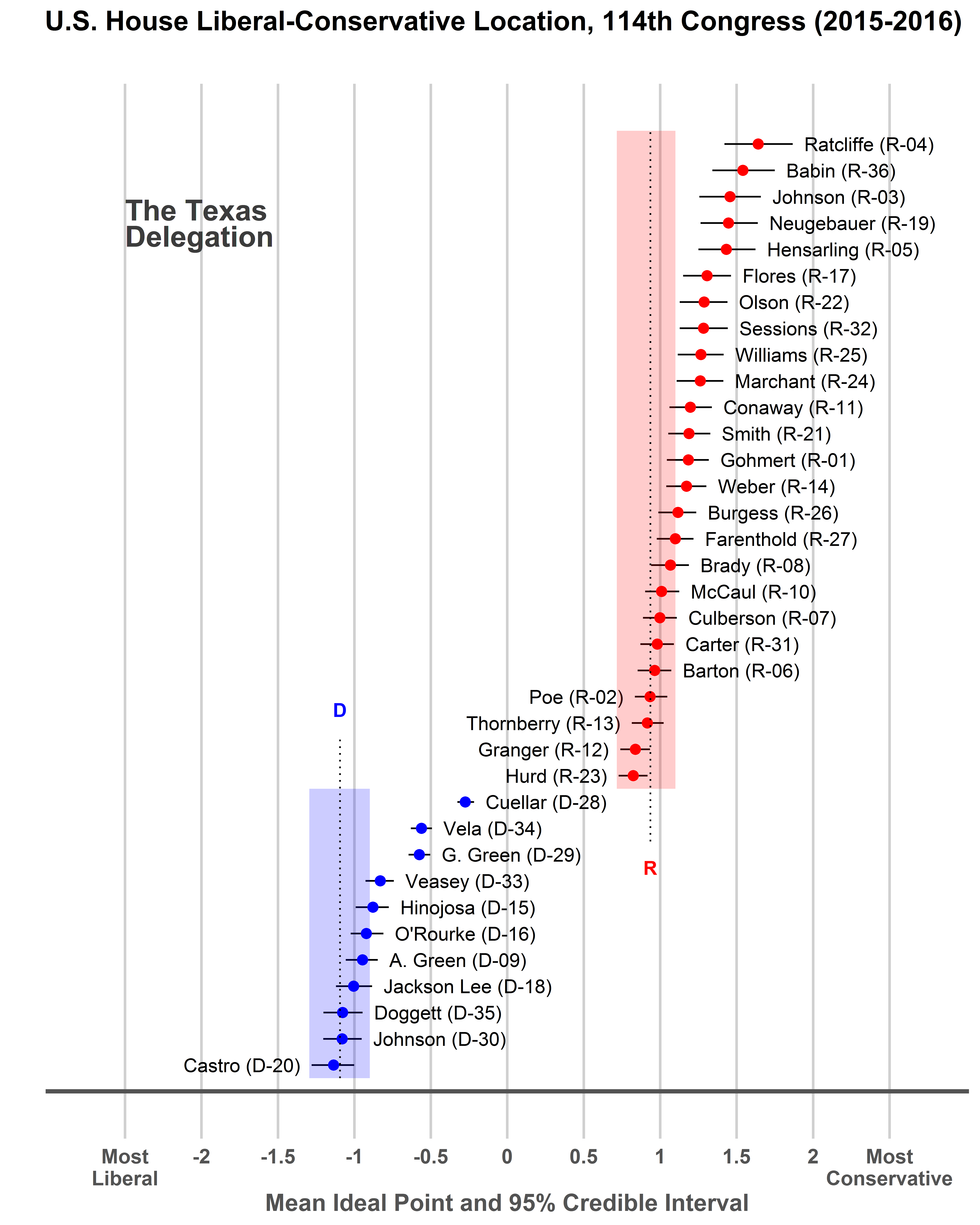The Texas delegation to the U.S. House, from right to left

Photo by Abby Livingston
In the 114th Congress (2015-16), the Texas delegation’s roll-call voting behavior once again demonstrated that Texas Republicans are, on average, notably more conservative than their fellow congressional Republicans. Likewise, Texas Democrats are on average notably more conservative than their fellow congressional Democrats. The data also reveal how the competitiveness of representatives’ congressional districts can influence their floor behavior. Separately, they show the quite different ideological profiles of two Texas Democrats considering 2018 U.S. Senate runs.
The chart illustrates the ideological locations, or Liberal Conservative (Lib-Con) Scores, for the 36 Texans who served in the U.S. House during the 114th Congress. It is based on a Bayesian analysis of the 1,123 non-lopsided roll-call votes cast during the 2015-16 period, a methodology similar to that employed for recent analyses of the Texas House and Texas Senate.

The vertical dotted lines represent the Lib-Con Score of the median national U.S. House Democrat (188 total), in blue, and national U.S. House Republican (247 total), in red.
The blue and red shaded areas to the left of the dotted line indicate the range of Lib-Con Score values for each respective party’s national U.S. House delegation between the 25 percent quartile boundary and the median, and those to the right represent the range between the median and the 75 percent quartile boundary. For example, any Republican located to the right of the red area was among the most conservative 25 percent of the 247 U.S. House Republicans, while any Democrat to the right of the blue area was among the most conservative 25 percent of the 188 U.S. House Democrats.
Twenty-one of the 25 Texas Republicans had Lib-Con Scores to the right of the national GOP delegation’s median Lib-Con Score. These include 15 Texas representatives within the most conservative quartile of House Republicans, including six who ranked within the most conservative decile of all GOP House members during the 114th Congress: John Ratcliffe, R-Heath (the most conservative House member of all, or 1st), Brian Babin, R-Woodville, (3rd), Sam Johnson, R-Richardson, (8th), Randy Neugebauer, R-Lubbock, (10th), Jeb Hensarling, R-Dallas, (11th), and Bill Flores, R-Bryan, (22nd).
In contrast, only four Texas House Republicans had Lib-Con Scores to the left of the national GOP median, two ever so slightly to the left of the median (Ted Poe, R-Humble, and Mac Thornberry, R-Clarendon) and two more noticeably distant from the party center (Kay Granger, R-Fort Worth, and Will Hurd, R-Helotes).
Looking ahead to the 2018 midterm elections, national Democrats have indicated that they intend to target three U.S. House seats presently held by Texas Republicans. At the top of this list is the state’s one true swing district, CD-23, presently held by Rep. Hurd. His centrist conservative voting record during the 114th Congress aided him in last year’s reelection effort, deflecting and defusing Democratic attacks that he was ideologically out of step with his constituents. Hurd defeated former Rep. Pete Gallego, D-Alpine, who he had unseated in 2014.
For advocates of redistricting reform designed to create more competitive legislative districts with the goal of electing more centrist members of congress, CD-23 provides compelling supporting evidence. This includes Hurd’s status as the most centrist member of the Texas GOP delegation during his freshman term in the 114th Congress as well as the centrist record of his predecessor. In the 113th Congress, Gallego ranked among the dozen most conservative U.S. House Democrats, and as the second most conservative Texas Democrat after Henry Cuellar, D-Laredo.
Two more Republicans in the Democrats’ crosshairs are Reps. John Culberson, R-Houston, and Pete Sessions, R-Dallas, in CD-7 and CD-32, respectively. Of the two, Culberson had the more centrist voting record during the 2015-16 period; Sessions’ significantly more conservative record could potentially make it easier for a Democratic challenger in 2018 to portray him as ‘too conservative’ for his district.
Ten of the 11 Texas Democrats had Lib-Con Scores to the right of the median national U.S. House Democrat, including five in the Democratic delegation’s most conservative quartile: Cuellar, Filemon Vela, D-Brownsville, Gene Green, D-Houston, Marc Veasey, D-Fort Worth and Rubén Hinojosa, D-Edinburg. Cuellar ranked as the fourth most conservative House Democrat in the 114th Congress. Joaquín Castro, D-San Antonio, was the only Texas Democrat with a Lib-Con Score to the left of the national Democratic delegation median during the 114th Congress.
While there appears to be a notable deficit of top-tier Democratic talent interested in challenging Republican Gov. Greg Abbott in 2018, Democrats have a surplus of candidates — Reps. Castro and Beto O’Rourke, D-El Paso — actively exploring 2018 challenges to Republican U.S. Sen. Ted Cruz. Castro’s ideological profile is almost perfectly in sync with that of national congressional Democrats (i.e., just to the left of the national party median) whereas O’Rourke’s ideological profile is that of the median Texas congressional Democrat, with five Texas Democrats located to his right and five to his left. In what is certain to be a no-holds-barred battle with Cruz, it is quite likely that Castro’s relatively liberal 2015-16 voting record would represent more of a liability than an asset in a general election campaign, especially when contrasted with O’Rourke’s notably more centrist record in the 114th Congress.
Without question, Castro brings many things to the table that O’Rourke does not (e.g., superior statewide name recognition, a national fundraising network, a greater potential ability to mobilize Latino voters in support of his candidacy), but being closer to the state’s ideological center is not one of them. As the chart graphically reveals, Castro was the most liberal member of the Lone Star State’s U.S. House delegation in the 114th Congress.

